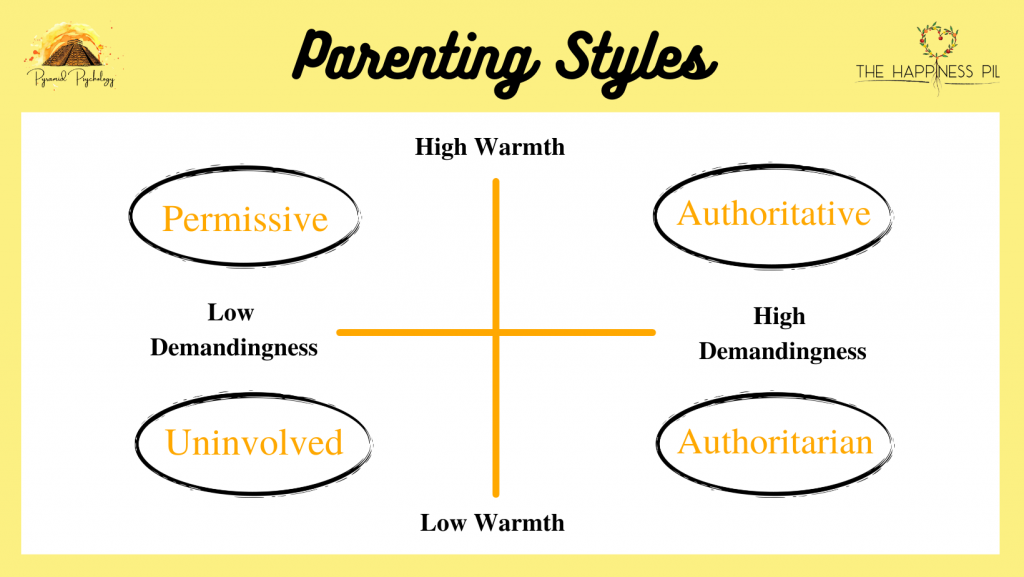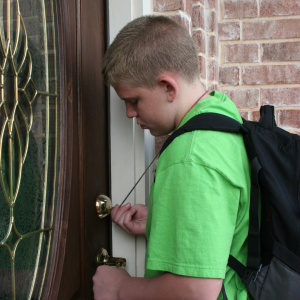Parenting Styles 101: Bridging the Gap of Communication with Your Teen
Is there a gap in communication between you and your teen? If you ever feel like you and your teen are speaking completely different languages which leads to tension and arguing, you are not alone. Understanding the various parenting styles – and which you lean towards – is a great place to start bridging that gap and strengthening the bond between the two of you!
Diana Baumrind, a psychologist in the 60’s, researched younger kids and their attachment with their parents. She looked for different patterns and behaviours that developed over time. She was highly focused on the parent-child relationship. From this research, Baumrind coined three different parenting styles. In the 80’s the research continued and a fourth parenting style was added.
The four parenting styles are: authoritarian, authoritative, permissive, and unengaged/neglectful.
Parenting Styles on A Continuum
Before we dive into each of the parenting styles below, it can be helpful to recognize that they are on a continuum rather than definitively either this style or that style. You may recognize yourself in more than one of the styles. There are two continuums, the first is for warmth/responsiveness, and the second is for high vs. low levels of demand. See the photo below:

In terms of academic success, mental health, and emotional wellbeing, studies consistently indicate that children and teens do best with more authoritative parenting styles. The neglectful parenting style has shown to be the worst for them.
With that being said, there are values to all parenting styles, as well as consequences for each. It is important for me to acknowledge each parenting style without judgement and the hope that knowing more about this will allow you to make the best decisions for your family and their well being..
You will very likely discover your dominating parenting style, as well as other parenting styles you recognize using (a secondary style if you will). With an open mind, you may even see ways you want to shift your style!
The Four Parenting Styles
Authoritarian Parenting Style

Photo from Canva Pro
Referring back to the image above, this style of parenting shows a high level of demand, and a low level of warmth.
There is a power differential between you and your teen – with you being in charge at the top, and your teen being at the bottom…You are the authority. The boss.
Something you might say to your teen is “because I said so”; there is very little room for negotiation, or having your teen weigh in on expectations or consequences. (It doesn’t mean you don’t care, just that what you say goes).
You are driven to have your teen do well in certain areas – to behave well, succeed academically, meet goals, etc. There is structure in your home, with a lot of rules; your expectations are clear. Emotions aren’t addressed or talked about a lot, and punishment is a strategy used readily.
Remember the continuum – you may notice sometimes you parent with the authoritarian parenting style, and maybe not other times. It isn’t necessarily ‘this’ or ‘that’ style.
Authoritative Parenting Style (Balanced or Engaged)
If your dominant parenting style is authoritative, your relationship with your teen involves a lot of warmth, AND there is a high demand from them. The power differential in this parenting style is still one with you being the caretaker, or the one in charge. However the gap between you and your teen is smaller. There is flexibility in their role.

Photo from Canva Pro
You have clear expectations and standards for your teen’s behaviours around respect, school, academics, etc. Something you may say to your teen is “let’s talk about it” – there is room for negotiation. You have built a ‘give and take’ style of communication with your teen.
So for example if you have the expectation that xyz chores must be completed after school, and then they can go out with their friends. Your teen would feel comfortable coming to you and asking if they can do the chores when they get back, or maybe partially complete them before going. There could be a conversation around this expectation.
In contrast, this conversation likely wouldn’t occur at all in the authoritarian style of parenting.
Permissive Parenting Style
You parent with a permissive style of parenting if there is a lot of warmth, and not a lot of demand.

Photo from Canva Pro
There are not very many rules in your home… The rules you do have in place may not be clear, and
are not often enforced. You avoid conflict with your teen whenever possible.
Avoiding conflict whenever possible and making your teen as happy as you can are important to you. You are indulgent with requests from your teen, for items, when they want to go out with friends, etc.
Your expectations for how your teen will contribute (academics, household responsibilities etc. are relatively low).
Using the same example with the chores above, your teen will most likely go out with their friends and do their chores later.. You sometimes end up doing the chores yourself, to avoid conflict. Or, they slide by altogether- maybe they don’t even have official chores to do.
Uninvolved Parenting Style (Disengaged/Neglectful)
The uninvolved parenting style involves little to no warmth, and very low demand.

Photo from Canva Pro
As a parent with this parenting style, you are not really engaged or interested in your teen; your teen fends for themselves. This could be from a variety of reasons – your own childhood, trauma, a heavy workload, competing priorities etc. Whatever the reason, you do not have a lot of time for your teen.
If your teen were to get invited out with friends, they would simply go without telling you. They most likely don’t have chores to worry about at all. Or, if they do, it is because you are absent.
It is important to note that while all parenting styles do have value, the uninvolved parenting style shows the worst outcomes for teens and their development – their emotional well being and mental health.
Using Your Parenting Style to Communicate with Your Teen
As you read through the four parenting styles, where did you find yourself on each continuum? Did you notice a dominant one or a secondary style of parenting you turn to?
Understanding your parenting style can help you see how it affects communication with your teen. If you are more authoritarian, your teen may not be very open to discussing what’s going on in their world and how they are feeling. If you are more permissive, your teen may treat you like more of a friend, giving you all the details on what’s up and also some of the treatment that seems reserved for friendships. If you are more authoritative, your teen may be asking a lot of

Photo from Canva Pro
questions and looking to negotiate boundaries often.
If you’re unsure (or you just like doing online quizzes) here is a quiz you can do to get an idea of your dominant parenting style. In this quiz, Micheal Popkin uses the terms Autocratic (closely related to Authoritarian), Permissive, and Active (closely related to Authoritative).
Of course, this is one part of the equation. At the end of the day, your teen has their own personality and temperament and will respond to parenting styles differently. Some teens may respond better to parents who are more authoritarian while others may thrive more with more permissive parenting. Even though research tells us the best outcomes seem to be linked to authoritative engaged parenting, each child is different.
Once you’ve pinpointed your go-to parenting style, you can start thinking about the strengths in your parenting. What are the things you are doing well as a parent? – Does your teen know what to expect, are you caring and engaged, , do you stop at the drop of a hat when your teen has something important to talk about, etc. These are all attributes that bridge the gap between you and your teen, and it is thanks to your parenting style!
Your Parenting Style History
Consider how you were raised – what parenting style did you see as you were growing up? How do you think that impacted you?
Some parents will repeat how they were parented, and others will do the opposite…Think about what values you hold onto from your parents’ parenting styles, and which you’ve let go of. What are your reasons for holding on or letting go?
Your Teen’s Response to Your Parenting Style
You can use the idea of parenting styles to parent with intention.
Once you know the what and why of your parenting style you can give some thought to how your teen is responding to your parenting style. Although the authoritative parenting style is associated with positive outcomes , every teen is different. You can ask yourself- when does my teen respond best to me (no you can’t say never!)? And, when does my teen respond the worst, almost a guaranteed shutdown or argument?
Then, look at your areas of vulnerability; things you want to work on. For me, I lean close to the authoritative parenting

style, but I can also be quite permissive – there is a lot of indulging and warmth with my kids…. There are some beautiful things with that; my relationship with them is really strong. But I can see when I have indulged too much. And I
recognize that my kids both ask for/expect a lot of things.
If you are looking for some ideas to support your communication with your teen, The Happiness Pill Program is a deep-dive program designed to bridge communication between parents and teens, just like you. It is a 6-month program with ongoing support for you to dive into your parenting and find ways to help things flow for your family. There is also support for your teen to develop communication skills, decrease anxiety & depression, and increase confidence. Check it out here.
Do not hesitate to reach out if you have questions! I am also accepting questions to be answered in my weekly blog article.
Email any time: info@pyramidpsychology.com
 Chantal Côté (she/her) is a psychologist and teen life coach living in Calgary, Alberta. After over a decade in non-profit and community mental health, Chantal started Pyramid Psychology, a practice dedicated to supporting teens – a population she is constantly amazed by. Chantal is on a mission to help 100,000 teen girls (and their parents) build bulletproof mindsets so they can weather the ups and downs of life. As part of this goal, Chantal has had the privilege of speaking at various events – virtual and live – to support teens and parents.
Chantal Côté (she/her) is a psychologist and teen life coach living in Calgary, Alberta. After over a decade in non-profit and community mental health, Chantal started Pyramid Psychology, a practice dedicated to supporting teens – a population she is constantly amazed by. Chantal is on a mission to help 100,000 teen girls (and their parents) build bulletproof mindsets so they can weather the ups and downs of life. As part of this goal, Chantal has had the privilege of speaking at various events – virtual and live – to support teens and parents.
Outside of this passion, Chantal is often in nature, writing poetry, playing ball hockey and hanging out with her loved ones.
Each week, Chantal writes a blog article in response to issues she hears from the parents and teens she connects with. If you have something you’d like to read more on – email ideas and questions to info@pyramidpsychology.com or DM us via Instagram or Facebook.








